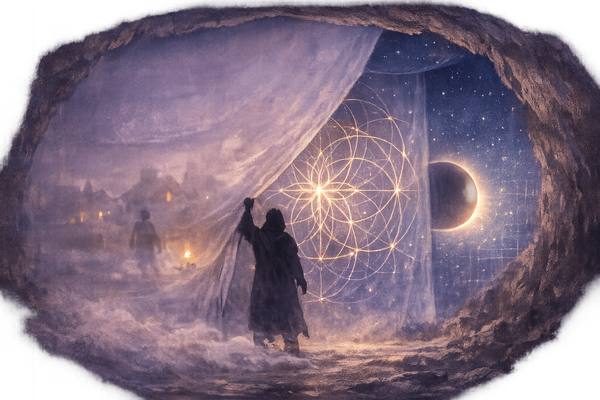Lake Baikal: The Siberian Mirror of Stars
Explore the spiritual and ecological significance of Lake Baikal, the world's oldest freshwater lake, revered for its beauty and cosmic energy.

Lake Baikal, located in Siberia, is the world's oldest and deepest freshwater lake, holding 20% of the planet's unfrozen freshwater. Beyond its stunning natural beauty, the lake is revered as a spiritual hub, often called a "cosmic mirror" due to its reflective waters and mystical energy.
Key Highlights:
- Age & Depth: Over 25 million years old and 5,387 feet deep.
- Clarity: Visibility extends up to 131 feet in summer.
- Biodiversity: Home to 2,500 species, with 60% found nowhere else.
- Spiritual Significance: Sacred to Siberian shamans and Buryat traditions, regarded as a bridge between physical and metaphysical realms.
- Sacred Sites: Olkhon Island and Shaman Rock are central to rituals and energy practices.
- Mystical Experiences: Visitors report altered states, time distortions, and unusual visual phenomena like "singing ice" in winter.
Lake Baikal is not just a natural wonder but also a spiritual and cultural treasure, offering a unique blend of ancient traditions, biodiversity, and cosmic energy. Its preservation is vital for both its ecological and spiritual heritage.
Shamanic ritual on Baikal Shore
Sacred Traditions and Spiritual History of Lake Baikal
Lake Baikal has long been a focal point for spiritual practices and beliefs, serving as a meeting ground for Buryat shamanism and Asian Buddhism. This blend of traditions has created a distinctive spiritual identity for the region, with Baikal's mystical energy at its core. The rituals, legends, and practices tied to the lake reveal a rich spiritual heritage that continues to thrive.
Shamanic Practices and Sacred Sites
The shamanic traditions of Lake Baikal are among the oldest and most enduring in the world. Olkhon Island, often referred to as the "Mecca of Shamanism in Siberia," is a central hub for these practices. For centuries, shamans have conducted sacred rituals here, channeling what they perceive as the lake's elemental forces.
"For Buryats Lake Baikal is a sacred and holy place. Historically, Baikal has given people food, fish, water, and there are many legends about Baikal." - Masha Bambuyeva, Buryat native of Severobaikalsk
In Buryat shamanic belief, the cosmos is divided into three realms: the upper world (home to gods), the middle world (inhabited by humans), and the lower world (where spirits dwell). Shamans act as intermediaries, connecting these realms through a cosmic axis known as the "Golden Pillar". One of the most revered sites is Shaman Rock, located at the source of the Angara River. This site is considered one of Asia's nine holiest places and is believed to be the dwelling of Ama Sagan Noyon, the river's spiritual guardian. Shamans frequently visit this site to perform rituals of healing, purification, and divination, leaving offerings for the spirits.
The shamanic community around Baikal remains active even today. According to shaman Irina Tanganova, there are "up to 100" practicing shamans in the region. These modern practitioners continue ancient traditions, using ceremonial tools like drums, costumes, and sacred substances to enter altered states of consciousness.
"Buryat land is totally Shaman land. All this land belongs to Buryat people and Shaman people. Shamanism is still very strong, and it doesn't conflict with other religions. It has existed like this from ancient times and it survives; in some cases it helps." - Vladimir Hidekel, professor of ecology at Irkutsk State University
Shamanism's resilience was notably demonstrated in 1996, when a conference on Central Asian shamanism brought together Buryat and Mongolian shamans with academics in the Baikal region. This event, which included purification ceremonies, symbolized a revival of shamanic traditions following decades of Soviet suppression.
A key aspect of Siberian shamanism is ancestor worship, where shamans seek guidance from ancestral spirits in the upper world. This practice underscores Baikal's role as a spiritual bridge, connecting the wisdom of the past with the challenges of the present.
Buddhist Views on Baikal's Elemental Energy
Buddhism has also become deeply intertwined with the spiritual traditions of the Baikal region. Buddhist monasteries regard the lake as a sacred mandala, a cosmic diagram that symbolizes the universe. Its waters are often used in meditation and rituals, representing purity and balance.
Historically, Buryat families often sent one child to a monastery, blending education with spiritual devotion. This tradition fostered strong ties between Buddhist teachings and local communities, ensuring the religion's lasting influence. Today, women make up nearly 80% of participants in Buddhist rituals and activities in Buryatia, reflecting the evolving nature of these practices.
One of the most important Buddhist sites is Alkhanai Mountain, home to the Temple of Great Benefit. This sacred site highlights how Buddhist philosophy has adapted to Baikal's unique landscape, recognizing the spiritual energy of its natural features. Similarly, the Burkhan Baabai sanctuary serves as a site where shamanic and Buddhist traditions converge, showcasing the shared reverence for Baikal's sacred energy.
The lake's pristine waters, which hold 20% of the world's unfrozen freshwater reserves, are seen by Buddhist practitioners as purifying agents that enhance meditation and spiritual renewal.
"One can destroy buildings but not a faith that is so deep." - Gonchok Lama, from Tamchinskii Monastery
Another notable event is the Yordyn Games Spring Festival of Indigenous Peoples of Baikal, held at the Ekhe Yordo mound. After a 100-year hiatus, this festival was revived and now attracts 2,000 to 3,000 visitors annually. The highlight is a circular dance around the hill, requiring 700 participants to complete the circle, a celebration of unity and tradition.
Buddhism's interpretation of Baikal emphasizes the interconnectedness of all elements - water, earth, fire, and air - viewing the lake as a living mandala where harmony is perfectly embodied. This perspective complements shamanic beliefs while offering its own lens on the lake's spiritual essence.
Lake Baikal as a Cosmic Mirror and Energy Center
Lake Baikal isn't just a stunning natural wonder - it’s often described as a "cosmic mirror", reflecting both the physical world and the metaphysical. Estimated to have formed around 25 million years ago in the Baikal Rift Zone, which continues to expand by about 4 millimeters (0.16 inches) each year, this ancient lake is said to radiate a unique energy. Geologist and metaphysical teacher James Tyberonn has highlighted the area as a global vortex of immense spiritual significance. He also notes that crystals and stones from the region carry powerful spiritual frequencies. This extraordinary geological and energetic foundation has made Baikal a hotspot for unusual phenomena that intrigue visitors from all over the world.
Strange Phenomena and Visual Effects
Visitors to Lake Baikal frequently report encountering strange visual phenomena, including mirages and optical anomalies that seem to defy the rules of physics. In the summer, the lake’s crystal-clear waters - offering underwater visibility of up to 131 feet (40 meters) - create an almost surreal experience, as though one is peering into an endless void. Winter, however, brings its own mysteries. Local folklore speaks of "singing ice", where the frozen lake emits haunting sounds that some believe carry ancestral echoes, capable of inducing altered states of consciousness. Adding to the lake’s mystique are the unexplained "ghost lights" that occasionally dance across its surface, leaving witnesses both awed and puzzled.
Time Shifts and Energy Vortexes
One of the most fascinating aspects of Lake Baikal is the reported distortion of time. Many visitors describe feeling as though hours pass in mere minutes when near the lake, attributing this phenomenon to its powerful energy field. Interestingly, the sediments at the lake’s bottom act as a natural archive of changes in Earth's geomagnetic field, further suggesting Baikal’s role as a recorder of planetary energy. During a meditation retreat in September 2015, participants experienced heightened energy sensations and altered perceptions. One attendee even described a profound shift in body vibration and an overwhelming sense of joy after swimming in the heart-shaped Nuru Nur lake.
How Baikal Compares to Other Energy Sites
Lake Baikal’s energy is as unique as its ecosystem. Unlike many sacred sites located in mountainous regions, which often evoke feelings of expansiveness and elevation, Baikal encourages introspection. Its combination of water’s conductive properties, tectonic activity, and magnetic field interactions creates a deeply reflective energy. With over 2,500 species of plants and animals - 60% of which are found nowhere else - Baikal’s biodiversity further enhances its distinct energy. Visitors often describe the lake as a "psychic mirror", helping them delve into their inner selves while amplifying their spiritual growth.
Victor, a visitor to Baikal, encapsulated the experience beautifully:
"Here you experience a rare sensation of uplift and spirituality, as if, within sight of eternity and perfection, you too have been touched by the mysterious influence of these magic concepts, you too are enveloped in the breath of the omnipotent presence, and a part of the magic secret of everything that exists. You are marked and singled out simply because you are standing on this shore, breathing this air and drinking this water. Nowhere else will you feel so much at one with nature."
With its ancient origins and millions of years of accumulated energy, Lake Baikal offers visitors an unparalleled opportunity for spiritual connection and self-discovery.
How to Connect with Lake Baikal's Spiritual Energy
Lake Baikal, often described as a mirror of the cosmos, holds a unique energy that can resonate deeply within your inner world. The beauty of this connection is that you don’t need to stand on its shores to feel its power. Through intentional practices, you can tune into the lake’s ancient energy, using it as a source for spiritual growth, dream exploration, or even soul-centered rituals. Two effective ways to engage with this energy are through dream work and water rituals.
Dream Work and Water Rituals
Siberian shamanic traditions have long regarded Lake Baikal as a source of spiritual insight, with shamans often turning to dreams to uncover hidden truths and wisdom. To connect with this practice, start by setting a clear intention before you sleep - focus on aligning with Baikal’s energy. Pay attention to any water imagery or feelings of timelessness that surface in your dreams, as these could be subtle messages tied to the lake’s essence. Using dream interpretation techniques can help you uncover deeper meanings and insights.
Some spiritual practitioners believe that Lake Baikal holds an ancient, untainted energy that predates the decline of planetary vitality. This energy is thought to offer a gateway to profound peace and unity. To enhance your connection, consider incorporating natural essences or oils that promote a heart-centered state of being.
Water rituals provide another meaningful way to align with Baikal’s energy. Across many traditions, water symbolizes wisdom, purity, and the interconnectedness of life. A simple yet powerful practice is a reflect-and-release ritual: choose a small natural item to represent your worries or burdens, then release it into a body of water with gratitude. This act symbolizes letting go and inviting renewal.
For a deeper experience, transform everyday routines into sacred rituals. Create a calming immersion bath by adding flowers, essential oils, and soothing music to your tub. As you relax, meditate on your intentions for clarity and peace, imagining yourself surrounded by the tranquil energy of Lake Baikal. Even mundane acts like washing your hands can become spiritual moments. Visualize the water cleansing not only your body but also your spirit, washing away negativity and inviting guidance and renewal. These rituals honor the life-sustaining power of water and deepen your connection to its spiritual essence.
Threats to Lake Baikal and Conservation Efforts
Lake Baikal, known for its spiritual significance and breathtaking beauty, is under threat. Its delicate ecosystem, holding one of the world’s largest freshwater reserves, faces mounting challenges from climate change, pollution, and human activity. These issues not only disrupt its physical environment but also endanger the spiritual heritage cherished by indigenous communities for centuries. Among these threats, climate change stands out as a major disruptor of Baikal’s natural balance.
Climate Change Effects on Baikal's Ecosystem
Rising temperatures are altering Lake Baikal’s long-standing seasonal rhythms. Over the past 165 years, the lake’s ice cover period has shortened by 31 days, and between 1977 and 2003, summer surface water temperatures rose by 3.6°F (2.0°C). These warmer waters encourage algae blooms, which cloud the lake’s famously clear waters. On top of this, the region has seen an increase in forest fires, which release ash and pollutants into Baikal’s watershed.
Mass tourism adds another layer of pressure, with nearly 2 million visitors annually. Local infrastructure struggles to handle the influx, and poor waste management allows pollutants to seep into the lake, threatening its pristine waters - waters that hold deep cultural and spiritual value for indigenous peoples. In response to these growing issues, a range of stakeholders has come together to protect Baikal’s unique legacy.
Joint Efforts to Protect the Sacred Waters
Efforts to safeguard Lake Baikal are as much about preserving its ecological health as they are about respecting its spiritual significance. One major initiative, the Lake Baikal Preservation Federal Project, has allocated 44 billion rubles (around $480 million USD) for ecological restoration between 2019 and 2024.
The Lake Baikal Foundation plays a key role in conservation, focusing on biodiversity, sustainable tourism, and water protection. Among their projects is the preservation of the critically endangered Khamar-Daban reindeer population, which had dwindled to just 24 individuals by 2024. These reindeer hold a special place in Buryat traditions. As Masha Bambuyeva explains:
"For Buryats Lake Baikal is a sacred and holy place. Historically, Baikal has given people food, fish, water, and there are many legends about Baikal."
Programs like National Parks without Garbage have made strides in waste management, diverting over 16 tons of recyclable materials from landfills. Additionally, wastewater discharges in the Republic of Buryatia were reduced by 50.59 million cubic meters in 2023. However, experts caution that more aggressive measures - such as banning phosphate-containing detergents to meet European Union standards - are urgently needed.
Initiatives promoting responsible tourism, such as the Great Baikal Trail, aim to minimize human impact on sacred sites. Similarly, the On Baikal Foundation bridges ecological research with community involvement, fostering a deeper appreciation for the lake’s dual importance - both environmental and spiritual.
"I am confident, however, that any development of legislation concerning Lake Baikal should be based on the harmony of preserving the great lake and the sustainable development of the Baikal natural territory." - Dmitry Shornikov, Director of ISU Research Institute for Legal Protection of Lake Baikal
Indigenous Buryat communities also play a crucial role in conservation. Drawing from their deep connection to the land, they provide valuable knowledge about seasonal changes and wildlife behavior. Their insights help ensure that modern conservation efforts remain respectful of Baikal’s sacred heritage while addressing environmental concerns.
Events like the Baikal Environmental Wave festival bring together artists, scientists, and activists each year to spotlight the importance of holistic conservation. These gatherings emphasize the need to honor both the ecological health and spiritual essence of this extraordinary lake.
Conclusion: The Siberian Mirror of Stars
Lake Baikal is far more than just the planet's oldest and deepest freshwater lake. It serves as a profound meeting point between the physical and spiritual realms, offering a space where ancient traditions and cosmic energies intertwine. For spiritual seekers and indigenous communities, this legendary body of water continues to inspire practices rooted in connection and transformation.
Beyond its breathtaking clarity, Baikal’s surface reflects more than the night sky - it symbolizes a gateway to the cosmos. Shamanic traditions revere the lake as a sacred channel for celestial energies, a natural bridge linking Earth with the vast universe. Its pristine waters are said to mirror not just the stars but also the inner depths of those who seek its guidance.
This cosmic connection provides modern spiritual practitioners with a rare chance to align their inner energies. Many believe Lake Baikal’s purity fosters calmness, trust, and clarity, encouraging individuals to embrace life’s changes with a sense of peace and acceptance. By drawing on the ancient wisdom tied to the lake, contemporary practices find new meaning in its transformative energy.
Baikal’s spiritual significance is beautifully captured by Australian Bush Flower Essences, which describes its essence as enabling individuals to “be in that pure still energy of being at one, so you are less influenced and invaded by mass consciousness and so less likely to make judgments and react”. This perspective highlights the lake’s unique ability to inspire self-awareness and inner stillness.
Whether through conservation efforts that safeguard this UNESCO World Heritage Site or through spiritual practices that honor its sacred nature, Lake Baikal serves as both an ecological marvel and a spiritual haven. Its dual role reminds us that preserving such treasures means valuing both their physical beauty and the deeper, intangible connections they inspire.
In its quiet yet profound way, Lake Baikal teaches us that the greatest insights often emerge when ancient wisdom and natural wonder come together, offering a path toward self-discovery and inner peace.
FAQs
What makes Lake Baikal such a distinctive spiritual and natural wonder?
Lake Baikal stands out as a marvel of nature, celebrated for its ecological and spiritual significance. As the oldest and deepest freshwater lake on Earth, it contains nearly 20% of the planet's unfrozen freshwater - an astounding fact that underscores its importance. Its crystal-clear waters are often said to have restorative and transformative qualities, attracting travelers seeking both natural beauty and spiritual renewal.
On a deeper level, Lake Baikal holds a special place in spiritual traditions. Local shamans view it as a sacred energy center and a cosmic reflection, believed to enhance one’s connection to higher states of awareness. Visitors frequently describe profound moments of introspection, heightened awareness, or even transformative experiences while spending time along its shores. This rare combination of ecological wonder and spiritual depth makes Lake Baikal unlike any other place in the world.
How do shamanism and Buddhism intertwine in the spiritual traditions of Lake Baikal?
At Lake Baikal, the spiritual traditions of shamanism and Buddhism have formed a fascinating bond, especially among the Buryat people. Shamanism, an ancient practice rooted in the region, has been part of the local culture for centuries. When Buddhism arrived in the 18th century, it didn’t replace these age-old rituals. Instead, it intertwined with them, creating a rich and interconnected spiritual landscape.
This blend is evident in many rituals and beliefs today. The lake itself is revered as a sacred place by followers of both traditions. It’s seen as a source of immense spiritual energy and a link between the physical and spiritual realms. As a result, it has become a central site for ceremonies, meditation, and quiet introspection. This unique coexistence reflects the depth and resilience of the region’s spiritual and cultural identity.
What are the biggest threats to Lake Baikal's ecosystem and spiritual significance, and how are they being addressed?
Lake Baikal, known as the world's oldest and deepest lake, is under threat from pollution, climate change, and unsustainable tourism. Industrial waste and the increasing influx of tourists have degraded its water quality, jeopardizing an ecosystem that supports species found nowhere else on the planet. Adding to these pressures, climate change is disrupting the lake’s natural balance by altering its water temperatures and seasonal cycles.
To address these challenges, efforts are underway to protect Lake Baikal through measures like establishing protected areas, cutting down on pollution, and encouraging more responsible tourism practices. The Russian government has introduced laws aimed at safeguarding the lake, though some recent policies have sparked concerns over deforestation and urban expansion near its shores. Protecting Lake Baikal is crucial - not just for its ecological significance but also for preserving the deep spiritual connection it holds for local communities, who revere it as a symbol of nature’s profound power and harmony.




